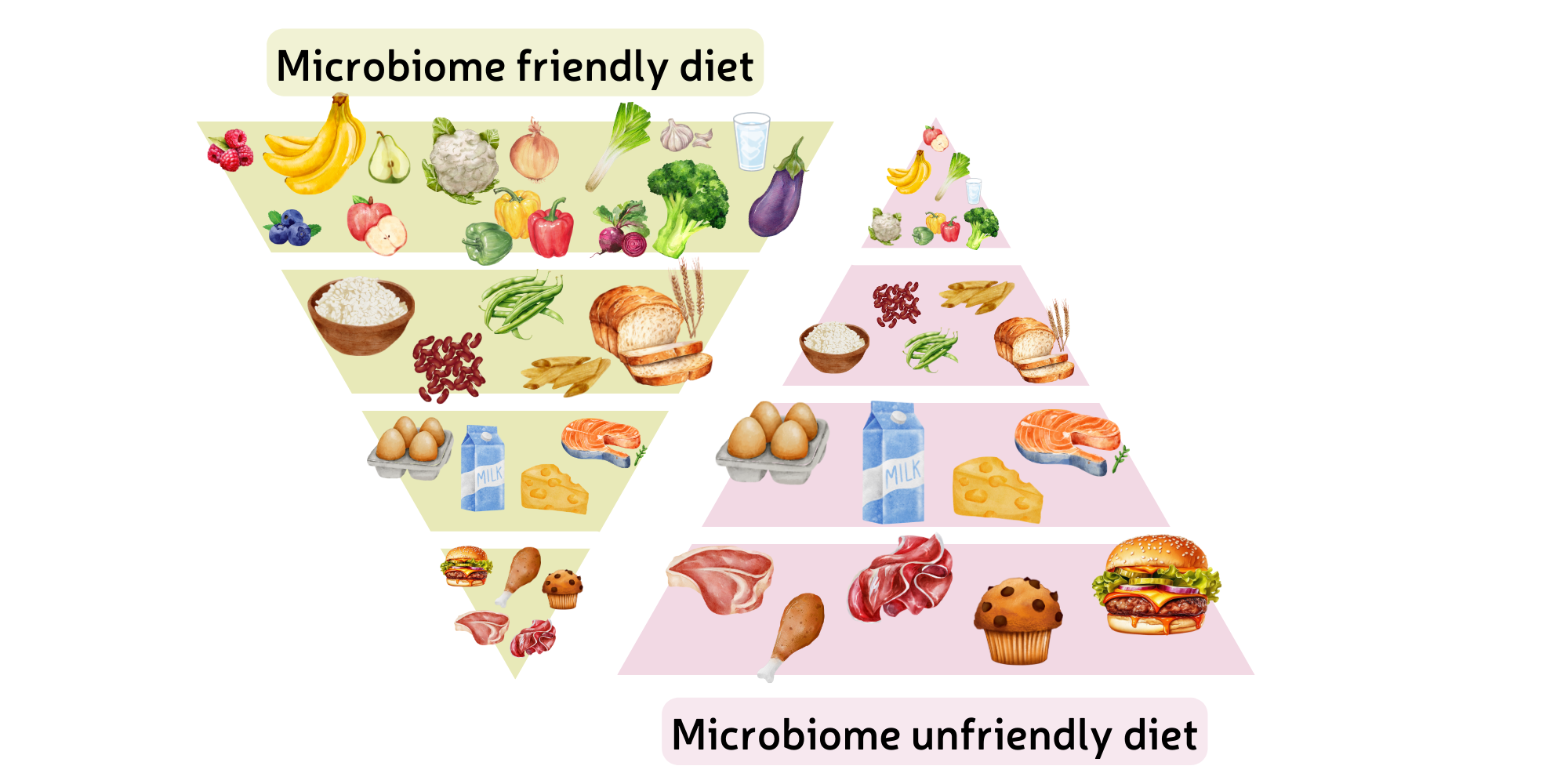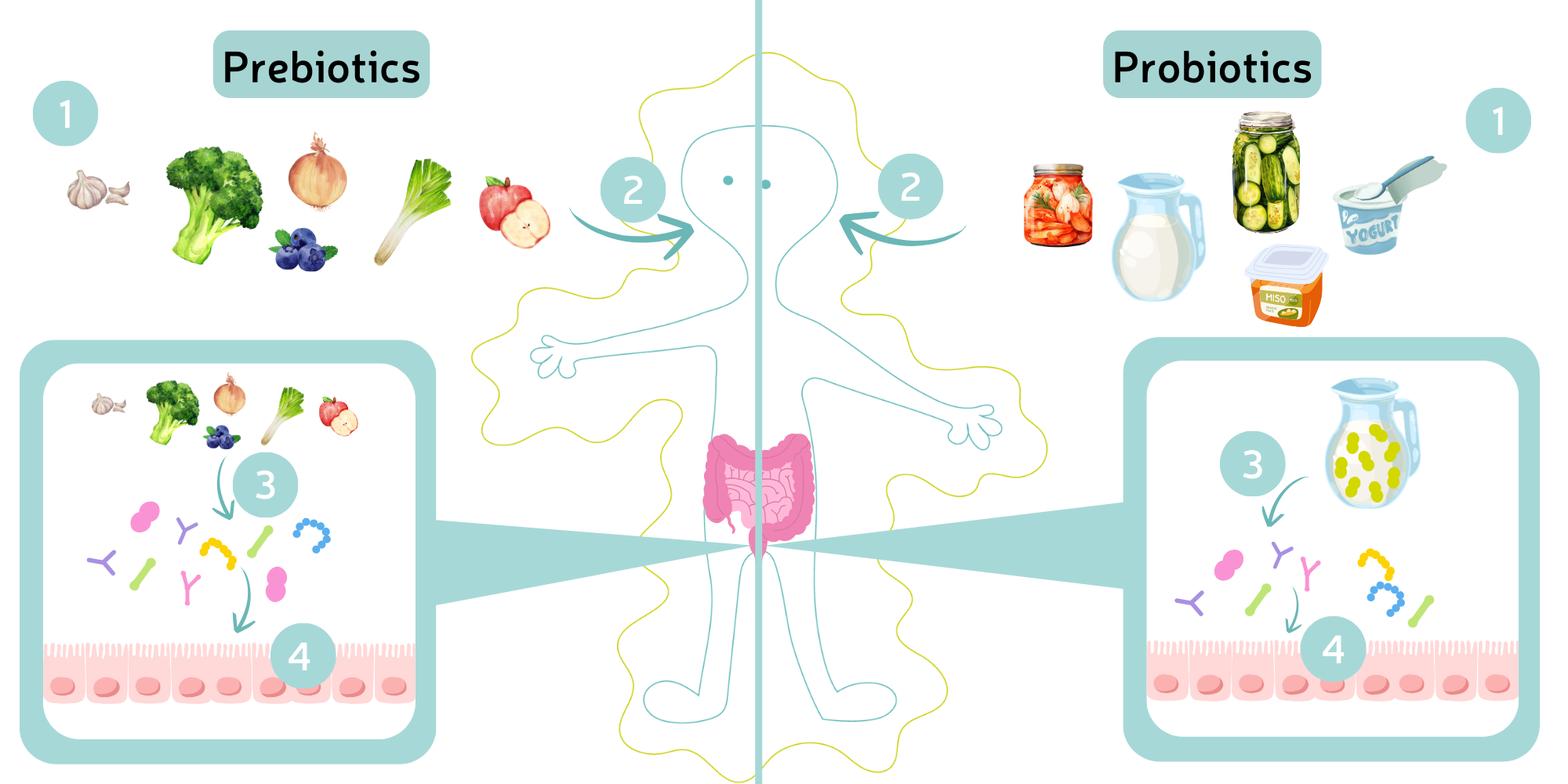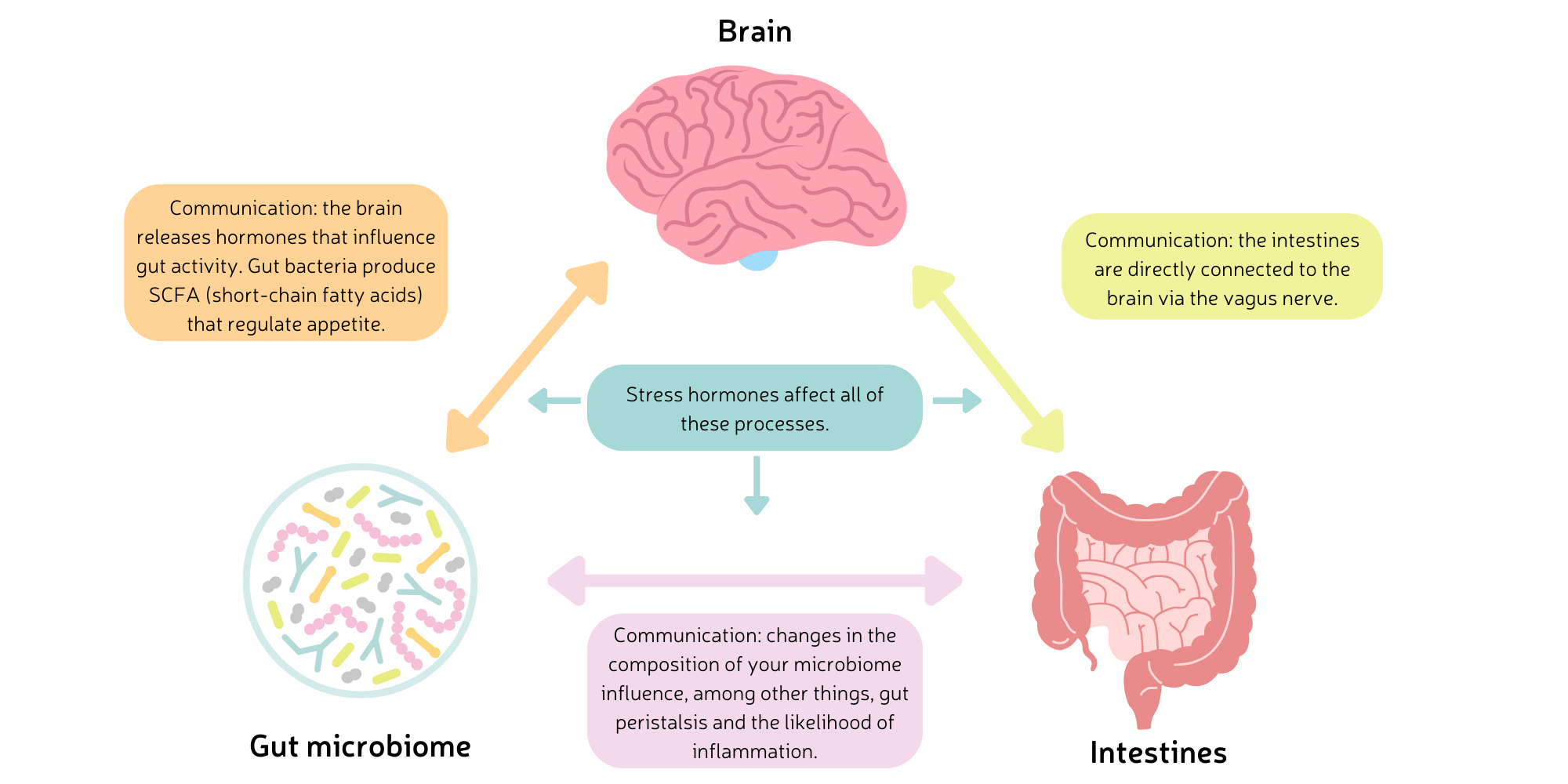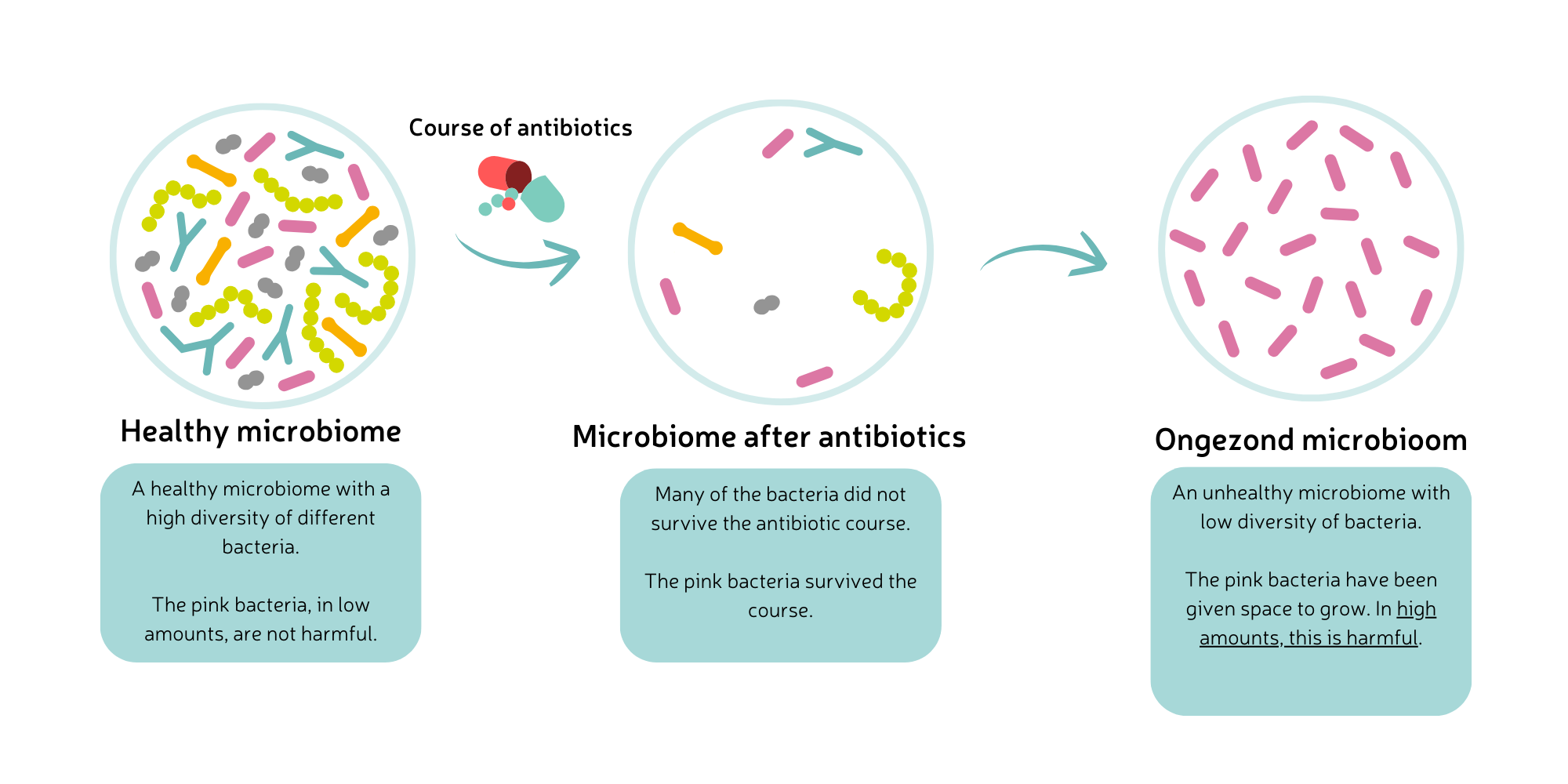The gut bacteria test that gives you insight into your health
- Microbiome test kit
- 16S analysis
- Scientific insights
Learn more
about the microbiota
Last updated: 12-02-2025
Good news: You have a large influence on whether your gut is healthy. With the right diet and exercise, you ensure that beneficial bacteria do their job – and that keeps your microbiome in top condition.
But which food is right, and how much should you exercise? On this page, we discuss the following topics:
What you eat throughout the day determines which bacteria grow in your gut – and which ones don't. A diet rich in fiber, protein, vitamins, and minerals contributes to a healthy gut microbiota. These nutrients stimulate the growth of beneficial bacterial species.
However, if you eat the same foods every day, your gut microbiota becomes monotonous. That’s why variety in your diet is important. For example, choose different vegetables, fruits, and legumes throughout the week. Your gut microbiota will then grow into a diverse community of bacteria – and that's exactly what you want!

In the image above, you see two diets that have different effects on the microbiome.
There is no ‘perfect’ bacterial composition in your gut. It’s about finding the right balance: a healthy mix of species ensures optimal metabolism and a strong immune system. In particular, dietary fibers, fermented foods, and a varied diet promote that balance and nourish many types of bacteria.
Tip: Try to include as many different colors as possible in your meals. For example, eat two to three different colored fruits or vegetables with each meal, and one to two with each snack. You can use the colors of the rainbow as a guide: (dark) red, orange/yellow, green, blue/purple, white/brown. Get our free eat-the-rainbow-in-vegetables tracker here!
First, what is the difference between prebiotics and probiotics? Prebiotics are fibers in food that are not digested but stimulate the growth and activity of beneficial bacteria in the colon. Fruits, vegetables, whole grains, and legumes are prebiotics.
Probiotics, on the other hand, are live bacteria that you ingest through certain foods like yogurt, kefir, kimchi, and other fermented products. The bacteria commonly used as probiotics are Lactobacillus and Bifidobacterium.
Probiotics offer significant benefits for your gut health. They ferment milk sugars and produce lactic acid (lactate). Lactate is useful because it lowers the acidity in the gut, making it harder for pathogens to grow while allowing beneficial bacteria to thrive. Lactate also serves as an energy source for other (desired) bacteria and stimulates the production of butyrate and propionate. In this way, probiotics can help restore a disrupted microbiome.

On the left in the image above, you can see a number of prebiotic foods (1) that are important to include in your diet (2). The nutrients from these foods are digested in your digestive system. Except for the dietary fibers; they are fermented in the colon by gut bacteria (3). During fermentation, useful substances like butyrate are produced (4).
On the right is the same process, but for probiotic foods (1). When you eat these foods (2), the beneficial bacteria reach your gut (3), where they can support the bacteria already living there: they help strengthen the intestinal wall and calm the immune system (4), thereby reducing inflammation.
Prebiotics and probiotics are also available as supplements. It is not necessary for everyone to take pre- or probiotics as supplements. However, if you know that your microbiota is out of balance and you want to restore it, it can certainly help.
You may have heard the health benefits of a low-carb diet all over the internet. This diet is meant to limit your intake of foods with carbohydrates, while increasing the intake of proteins and fats. Forms of carbohydrates in our diet include sugars, starch, and fiber. Carbs are found in bread, potatoes, legumes, vegetables, and fruit, but also in soda, cookies, and candy.
Cutting back on soda, cookies, and candy will definitely provide health benefits for your body. However, your microbiome will not benefit as much from a diet low in fiber. Scientific research has shown that it reduces the production of butyrate in the gut.
To understand what butyrate is and what it’s good for, first read this page. In short: if you cut carbs from your diet, certain bacteria (such as Roseburia and Eubacterium) won’t get enough nutrients (fiber), which reduces their growth and butyrate production. This affects many processes, such as hormone balance, blood sugar levels, and immune system function.
So, is a low-carb diet good for your gut? No, certain gut bacteria need the dietary fibers from carbohydrate products to support necessary body processes.
In addition to diet, how much you move also determines your gut health. Extensive scientific research has been done on the influence of exercise on the gut microbiome. The results are consistent: exercise promotes a diverse microbiota. One caveat is that people who exercise regularly often also have a healthy diet and good BMI, which also contributes to this effect.
Exercise triggers various processes in your body, including blood circulation, bile production, and digestion. These processes then promote the growth of many bacterial species that you cannot activate with diet alone. With regular exercise, your microbiota becomes more diverse, and this offers numerous health benefits.
What does exercise do? | What does this mean for your gut bacteria? |
Stimulates blood circulation | More nutrients like short-chain fatty acids (SCFAs) reach the gut. Bacteria use these substances as an energy source, causing them to grow faster. |
Increases oxygen supply | Although the gut contains little oxygen, exercise provides a small amount of extra oxygen. Some bacteria thrive with that little bit of oxygen. |
Stimulates bile production | Some bacteria use bile as a food source. More bile means better growth of these species. |
Helps with smooth digestion | With smooth digestion, dietary fibers reach the colon faster. Gut bacteria convert these fibers into useful substances like butyrate. |
Reduces inflammation | Exercise indirectly stimulates mucus production, strengthening the mucosal layer over the gut wall. This gives pathogens less chance of entering the gut, and beneficial bacteria can grow well. |
But how much exercise is enough to get these processes going? We found in our database that at least two hours of cardio per week makes your microbiome more diverse.
Stress is unhealthy, but why exactly? The gut and brain have a two-way communication (via the vagus nerve): not only do the intestines send signals to the brain, but the brain can also change the composition of the microbiota by producing hormones.
When you experience stress, your body stimulates the production of the hormone cortisol. With higher levels of this hormone, beneficial bacteria (such as Bacteroides and Lactobacillus) do not grow as well. However, Clostridium and Enterobacteriaceae grow better – and in large quantities, these bacteria can become harmful. Scientists are still unsure of exactly how these processes work. But the clear result is known: cortisol throws the microbiota out of balance.

Gut bacteria are naturally closely connected with the intestines, but also with the brain. There is fast communication thanks to substances (like hormones and SCFAs) that race through the body. These substances trigger many processes (such as immunity and gut peristalsis). But there are also substances, like the stress hormone cortisol, that work against these processes. As a result, you may experience stomach issues or develop constipation.
Besides diet, exercise, and hormones, antibiotics can also disrupt your microbiota. Antibiotics are medications prescribed by doctors to cure bacterial infections. This type of medication works by killing certain bacteria or inhibiting their growth.
There are different types of antibiotics, such as penicillin, cephalosporins, and carbapenems. Which bacteria are killed or inhibited depends on the antibiotic, the dosage, and duration of use.
Antibiotics have cured many people of bacterial infections – and even saved lives (!). But it’s important to understand that antibiotics don’t differentiate between beneficial and harmful bacteria. Bacteria that are normally harmless can increase in number after a course of antibiotics and can become harmful. This disrupts the balance in your microbiota and can weaken your immune system with prolonged use.

If you've had an antibiotic treatment in the past and still experience (gut) issues, your microbiota may be out of balance. To find a suitable solution, it’s important to first gain insight into your current balance. A microbiome test can help by providing a clear picture of your microbiota composition. With this information, you can work towards improving your microbiome.
If you need to follow an antibiotic course in the future, we have a useful tip for you: in addition to eating healthy foods, adding probiotics to your diet can help support your microbiota.
Many people suffer from gut issues, and the cause can sometimes be hard to identify. If you’re not able to figure out why you have specific symptoms with a doctor or specialist, it may be worth doing a microbiome test. Read here what our test examines and whether it might apply to you.
Aoun, A., Darwish, F., & Hamod, N. (2020). The influence of the gut microbiome on obesity in adults and the role of probiotics, prebiotics, and synbiotics for weight loss. Preventive nutrition and food science, 25(2), 113. doi: 10.3746/pnf.2020.25.2.113
Bhattarai, Y., Muniz Pedrogo, D. A., & Kashyap, P. C. (2017). Irritable bowel syndrome: a gut microbiota-related disorder?. American Journal of Physiology-Gastrointestinal and Liver Physiology, 312(1), G52-G62. https://doi.org/10.1111/ijpo.12480
Collins, S. M., Surette, M., & Bercik, P. (2012). The interplay between the intestinal microbiota and the brain. Nature Reviews Microbiology, 10(11), 735-742. https://doi.org/10.1038/nrmicro2876
Liu, Q., Yu, Z., Tian, F., Zhao, J., Zhang, H., Zhai, Q., & Chen, W. (2020). Surface components and metabolites of probiotics for regulation of intestinal epithelial barrier. Microbial Cell Factories, 19, 1-11. https://doi.org/10.1186/s12934-020-1289-4
Monda, V., Villano, I., Messina, A., Valenzano, A., Esposito, T., Moscatelli, F., ... & Messina, G. (2017). Exercise modifies the gut microbiota with positive health effects. Oxidative medicine and cellular longevity, 2017(1), 3831972. https://doi.org/10.1155/2017/3831972
Oh, B., Kim, B. S., Kim, J. W., Kim, J. S., Koh, S. J., Kim, B. G., ... & Chun, J. (2016). The effect of probiotics on gut microbiota during the Helicobacter pylori eradication: randomized controlled trial. Helicobacter, 21(3), 165-174. https://doi.org/10.1111/hel.12270
Rinninella, E., Raoul, P., Cintoni, M., Franceschi, F., Miggiano, G. A. D., Gasbarrini, A., & Mele, M. C. (2019). What is the healthy gut microbiota composition? A changing ecosystem across age, environment, diet, and diseases. Microorganisms, 7(1), 14. https://doi.org/10.3390/microorganisms7010014
Sánchez, B., Delgado, S., Blancoâ€ÂÂÂÂÂÂÂÂÂÂÂMíguez, A., Lourenço, A., Gueimonde, M., & Margolles, A. (2017). Probiotics, gut microbiota, and their influence on host health and disease. Molecular nutrition & food research, 61(1), 1600240. https://doi.org/10.1002/mnfr.201600240
Wang, X., Zhang, P., & Zhang, X. (2021). Probiotics regulate gut microbiota: an effective method to improve immunity. Molecules, 26(19), 6076. https://doi.org/10.3390/molecules
KvK nummer: 65867637
Website door: Ratio Design
This website uses essential cookies to ensure correct functionality. In order to improve our site we can also use optional cookies.
More information